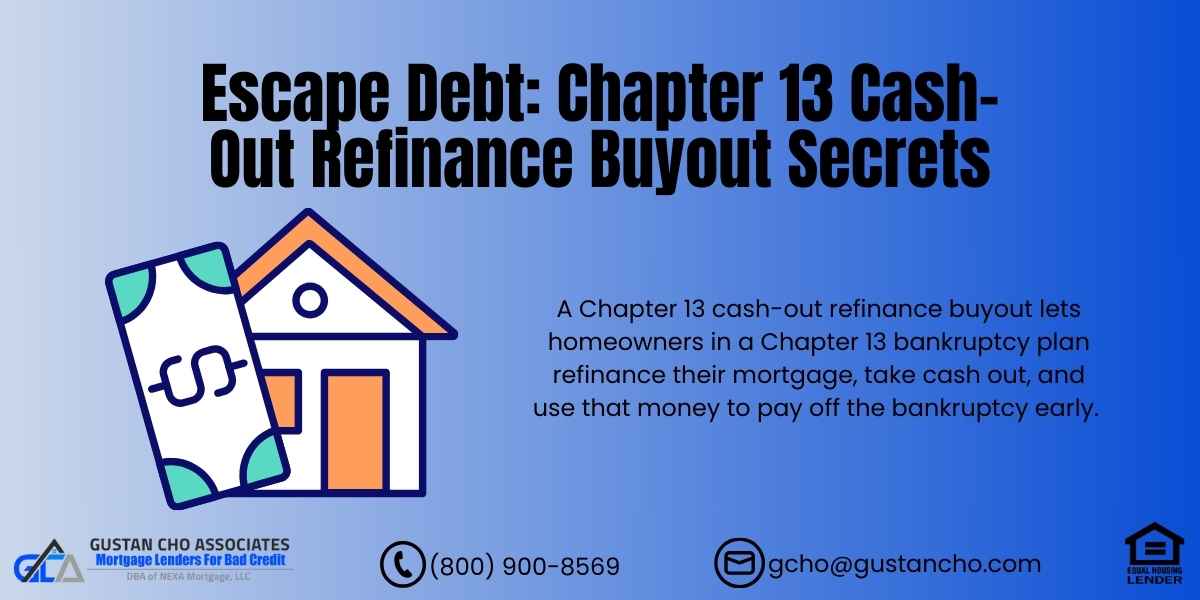Chapter 13 Cash-Out Refinance Buyout Secrets
Chapter 13 Cash-Out Refinance Buyout: How to End Your Bankruptcy Early and Get Your Life Back
Are you currently stuck in a Chapter 13 bankruptcy plan? You might not know this, but there’s a smart way to exit early. It’s called a Chapter 13 cash-out refinance buyout, which could change your financial future faster than you thought possible.
What Exactly Is a Chapter 13 Cash-Out Refinance Buyout?
A Chapter 13 cash-out refinance buyout lets homeowners in a Chapter 13 bankruptcy plan refinance their mortgage, take cash out, and use that money to pay off the bankruptcy early. You can end your bankruptcy sooner, reduce stress, and start fresh financially. Imagine no longer having to report every penny you earn to the bankruptcy trustee or worrying about staying in the plan for 3-5 years. That’s the power of a Chapter 13 cash-out refinance buyout.
Are you currently in a Chapter 13 bankruptcy repayment plan and need extra cash?
Apply Now And Get qualify for a mortgage refinance to pay off your Chapter 13 plan early
Can You Really Refinance During a Chapter 13 Bankruptcy?
Yes, you can! Many homeowners don’t know this, but if you’ve made at least 12 monthly bankruptcy payments on time, you can qualify for a Chapter 13 cash-out refinance buyout. But it’s important to know exactly how this works and what you’ll need to qualify.
How Does a Chapter 13 Cash-Out Refinance Buyout Work?
When you refinance your home during Chapter 13, you take out a new mortgage loan. The loan amount will include your current mortgage plus extra money (cash out) based on your home’s equity. You use this cash to pay off your remaining Chapter 13 debt early. This can help you end your bankruptcy immediately rather than waiting out the entire repayment plan.
Recent Updates for 2025 on Chapter 13 Cash-Out Refinance Buyout
As of 2025, FHA guidelines let you refinance your home and pull cash out up to 80% of your home’s value, even during Chapter 13. For veterans, VA loans can go up to 100% of your home’s value. This is great news for homeowners who need a little extra cash to close out their bankruptcy faster.
Qualifying for a Chapter 13 Cash-Out Refinance Buyout
To qualify, you must:
- Have made at least 12 months of on-time payments to your bankruptcy trustee.
- Obtain approval from both your bankruptcy trustee and the bankruptcy court.
- Have equity built up in your home (typically at least 20%).
- Meet lender-specific credit score and income guidelines.
Don’t worry—most trustees are willing to approve this refinance option because it helps creditors get paid sooner.
Why Does a Chapter 13 Cash-Out Refinance Buyout?
A Chapter 13 cash-out refinance buyout has several advantages:
- End Bankruptcy Early: Paying off your bankruptcy early can dramatically improve your credit score and financial freedom.
- Reduce Debt Faster: Use the extra money from refinancing to pay off your Chapter 13 debt immediately.
- Avoid Foreclosure: Protect your home from foreclosure threats that come with long-term financial struggles.
- Lower Interest Rates: Get today’s lower rates, potentially saving thousands over your loan’s life.
- Simplify Finances: Consolidate high-interest debts into one manageable monthly payment.
Qualifications for a Chapter 13 Cash-Out Refinance Buyout

To get approved for a Chapter 13 cash-out refinance buyout, lenders look closely at these factors:
- Credit Scores: Lenders usually like to see scores around 580 or higher, although some lenders may allow lower scores.
- Debt-to-Income (DTI): Ideally, your total monthly debts should be below 50% of your monthly income. FHA loans offer some flexibility here.
- Stable Income: You must show proof of steady income and the ability to afford new mortgage payments.
Real-Life Success Story
Consider Sarah and Mike, who had been in Chapter 13 bankruptcy for two years. This meant they were working hard to pay off their debts. During this time, the value of their house went up. Because of this increase, they had enough money, or equity, in their home to look into a Chapter 13 cash-out refinance buyout.
This new option allowed them to refinance their mortgage. They could change their loan to take advantage of the house’s higher value. After they did this, they were able to end their bankruptcy right away. This was a big relief for them!
Not only that, but they also reduced their monthly payments by $400. That’s a lot of money saved each month! With these savings, Sarah and Mike could focus on rebuilding their credit much faster. They were excited to start fresh and move forward with their lives without the weight of bankruptcy holding them back.
Step-by-Step Guide: Getting a Chapter 13 Cash-Out Refinance Buyout
Here’s a simple breakdown of the process:
- Check Your Eligibility: Make sure you’ve made at least 12 on-time bankruptcy payments.
- Talk to Your Trustee: Your trustee must approve your refinance plan.
- Find the Right Lender: Work with lenders experienced in Chapter 13 cash-out refinance buyouts.
- Submit Documentation: You’ll need proof of income, payment history, and trustee approval.
- Court Approval: Your bankruptcy court will review and approve your refinance.
- Close on the Refinance: Once approved, you’ll close the loan, get cash, and exit bankruptcy.
Common Mistakes to Avoid in a Chapter 13 Cash-Out Refinance Buyout
- Not Getting Court Approval First: Always get approval from your trustee and court before refinancing.
- Rushing the Process: Take time to find the best lender who understands bankruptcy refinancing.
- Skipping Payments: Always keep paying your bankruptcy plan and mortgage on time until the process is complete.
Why Work With a Bankruptcy Attorney?
When going through a Chapter 13 cash-out refinance buyout, having a good bankruptcy attorney can make a big difference. They will help you with all the important papers you need to fill out and guide you through the court process. They also talk with your trustee and lenders to get the best deal for you. Plus, they make sure everything you do with your refinance follows the bankruptcy rules. This way, you can get the help you need without worrying about making mistakes.
Alternatives to Chapter 13 Cash-Out Refinance Buyout
While a Chapter 13 cash-out refinance buyout can be a helpful option for some people, it’s important to explore other choices as well. Here are a few alternatives to think about:
- Loan Modification: You can change the terms of your loan with this option. You might be able to lower your monthly payments or get a better interest rate without taking any cash out. It’s a good way to make your payments more manageable.
- Standard Refinancing: If your home doesn’t have enough equity for a cash-out refinance, you can still go ahead and refinance your loan.This means you can change your loan to get a lower interest rate or reduce your monthly payments. It helps save money without taking cash from your home.
- Wait Out Bankruptcy: If these options aren’t possible for you right now, you might consider completing your repayment plan. Finishing your Chapter 13 plan can help you improve your financial situation over time. Once it’s done, you may have more opportunities to refinance or make other changes.
Exploring these alternatives can help you find the best solution for your situation.
Get the Right Lender for Your Chapter 13 Cash-Out Refinance Buyout
Not every lender offers refinancing during Chapter 13. You’ll need a lender experienced with FHA or VA cash-out refinancing during bankruptcy. Mortgage Lenders For Bad Credit specializes in helping borrowers just like you refinance, even in challenging financial situations.
Is a Chapter 13 Cash-Out Refinance Buyout Right For You?
Ask yourself:
- Do I have enough equity (at least 20%)?
- Have I made timely Chapter 13 payments for at least 12 months?
- Am I ready to get court approval and follow through the process?
If you answer yes, a Chapter 13 cash-out refinance buyout could be your fastest route to financial recovery.
Start Your Chapter 13 Cash-Out Refinance Buyout Today!
You’ve worked hard to rebuild your life. It’s time to move forward. Our experts are ready to help you every step of the way. With clear guidance and the right resources, you can end your Chapter 13 bankruptcy sooner and take control of your financial future.
Lower Your Payments, Simplify Your Debt
Don’t wait—reach out today and find out how a Chapter 13 cash-out refinance buyout can give you back the freedom you deserve.
Frequently Asked Questions About Chapter 13 Cash-Out Refinance Buyout:
Q: What is a Chapter 13 cash-out refinance buyout?
A: A Chapter 13 cash-out refinance buyout lets you refinance your home to take cash out and pay off your bankruptcy early.
Q: Can I do a Chapter 13 cash-out refinance if I’m still in bankruptcy?
A: Yes, you can qualify if you’ve made at least 12 monthly bankruptcy payments on time.
Q: How much equity do I need for a Chapter 13 cash-out refinance?
A: Most lenders want you to qualify for at least 20% equity in your home.
Q: Will I need court approval for a Chapter 13 cash-out refinance?
A: Yes, both your bankruptcy trustee and the court must approve your refinance.
Q: Can veterans do a Chapter 13 cash-out refinance?
A: Veterans have the opportunity to refinance as much as 100% of their home’s worth through a VA loan.
Q: Do I need good credit for a Chapter 13 cash-out refinance?
A: Lenders usually prefer credit scores of 580 or higher, but some lenders may approve lower scores.
Q: Does a Chapter 13 cash-out refinance lower my monthly payments?
A: Yes, refinancing can lower your monthly payments and help you save money on interest.
Q: How long does it take to complete a Chapter 13 cash-out refinance?
A: Depending on court approval, it typically takes around 45-60 days from start to finish.
Q: Can I use the cash from my Chapter 13 cash-out refinance to pay off other debts?
A: Yes, you can use the money to pay off your Chapter 13 debts or other high-interest debts.
Q: Who can help me get a Chapter 13 cash-out refinance?
A: Mortgage Lenders For Bad Credit specializes in helping homeowners like you refinance during Chapter 13 bankruptcy.
This blog about the waiting period after foreclosure requirements for borrowers on title but not on mortgage was updated on March 17th, 2025.
Turn Your Home’s Equity into Freedom from Chapter 13 Bankruptcy
Apply Now And Contact Our Bankruptcy Mortgage Experts!







